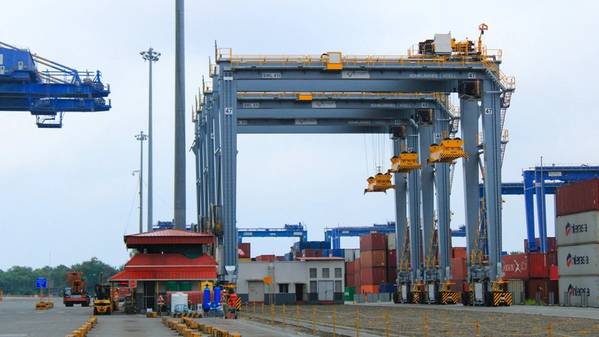
Emirati multinational logistics company DP World announced a new sustainability target in India, aiming for at least 60% of the energy required at its terminal operations to come from renewable power sources by 2026—a mirror of the Indian government's commitment toward achieving 60% green power sourcing for the maritime sector by 2030.
DP World said it aims to switch all fossil fuel powered equipment and vehicles at its terminal operations in India to electric power. It has already initiated open access sourcing of green power at its two terminals in Nhava Sheva (NSIGT and NSICT) which will help replace about 75% of conventional electricity needs with green power, leading to about 50% reduction in carbon emissions at the facilities.
Rizwan Soomar, CEO and Managing Director for Middle East, North Africa and India Subcontinent at DP World, said, “We are deeply committed to transforming our terminal operations to make trade greener and more efficient. As we progress on the path to meet 60% of power requirements at all our terminals from green sources by 2026, we will continue to be inspired by the tenets of the Maritime India Vision 2030 and will work towards fulfilling the national climate agenda to create shared value for our business and society. We plan to replicate the open access green power sourcing for all our other portfolio assets across India.”
Across its terminals in India, DP World is already converting its fleet of diesel-powered rubber tired gantry cranes (RTG) to electric and setting up solar power installations. The company recently commissioned six new e-RTGS at Mundra International Container Terminal (MICT) in Gujarat and four new e-RTGs at the International Container Transhipment Terminal (ICTT) in Cochin, Kerala.
The move toward 100% electrification of the existing fleet of RTGs will significantly help reduce the carbon footprint of cargo transiting through the terminals. Renewable energy is also being integrated into the design of terminals. DP World’s new greenfield terminal at Tuna-Tekra in Gujarat is aiming to be 100% compliant with the government’s Green Ports guidelines. DP World will also continue to explore green power purchase agreements (PPAs), additional rooftop solar installations and low-carbon technology solutions across its entire portfolio in India.
Globally, DP World is committed to achieving carbon neutrality by 2040 and net zero carbon emissions by 2050, with an intermediate target of 28% reduction of carbon footprint by 2030.



